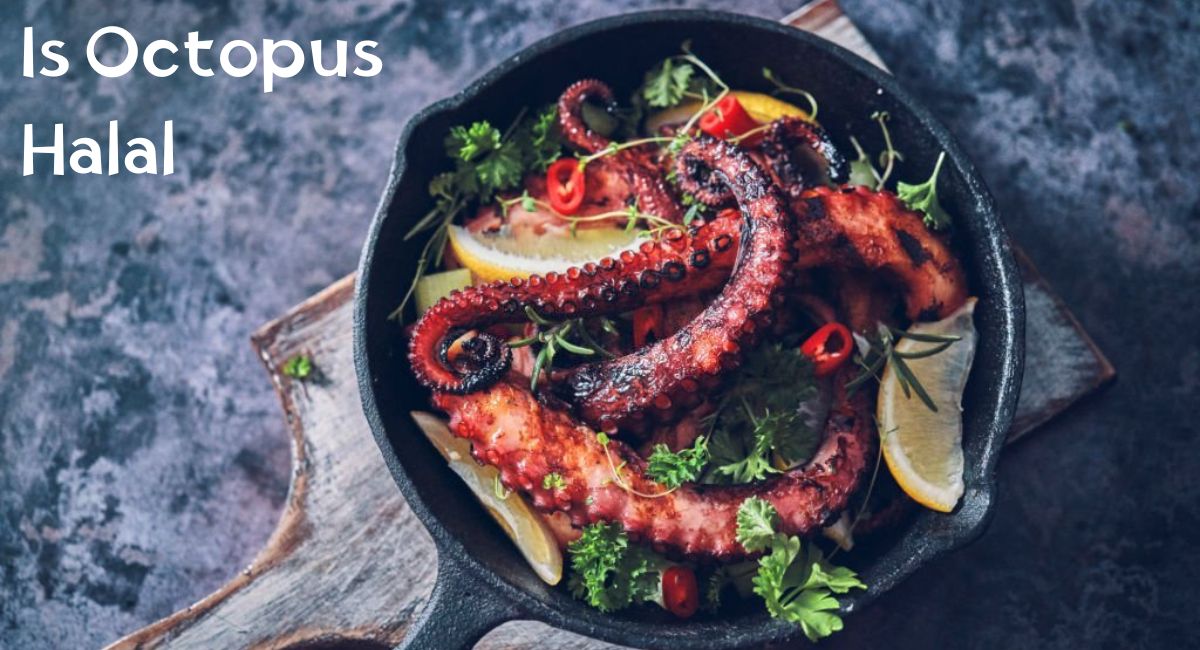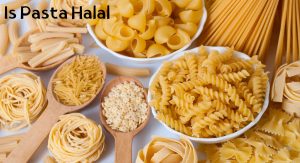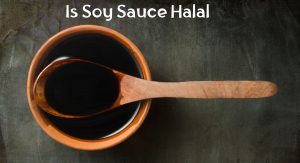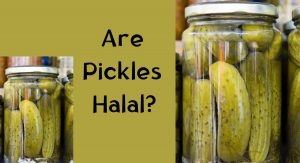Octopus, a fascinating creature of the sea, has long been a subject of culinary curiosity and debate in various cultures. One aspect that arises when discussing the consumption of octopus is its compliance with Islamic dietary laws. The question of whether octopus is considered halal or not has been a topic of discussion among scholars and individuals seeking clarity on this matter.
This article aims to shed light on the halal status of octopus from an Islamic perspective, delving into the various viewpoints and interpretations within the Muslim community. By examining religious texts, scholarly opinions, and considerations of the octopus’s characteristics, we seek to provide a comprehensive understanding of whether octopus is deemed halal or haram according to Islamic dietary guidelines.
About Octopus and Octopus Meat
An octopus is a soft-bodied, eight-limbed mollusk belonging to the order Octopoda, which is part of the class Cephalopoda. They are bilaterally symmetric and have a bulbous head, large eyes, and eight arms, also known as tentacles. They are invertebrates and are closely related to other cephalopods like squids and cuttlefish.
Octopuses are found in all the world’s oceans, with certain species being more abundant in warm, tropical waters. They are known for their unique characteristics and behaviors. They have the ability to change their skin color and texture, allowing them to camouflage and blend seamlessly into their surroundings. This ability to hide in plain sight is an effective defense mechanism against predators.
In the culinary world, octopuses are consumed in various cultures around the globe. The arms and sometimes other body parts of the octopus are prepared in various ways, often varying by species and geographical region. It is a common ingredient in Japanese cuisine, where it is used in dishes such as sushi, sashimi, karaage, stew, sour salad, takoyaki, and akashiyaki.
Octopus meat is a culinary delicacy and is known for its unique taste, texture, and nutritional profile. It has a unique texture that is smooth but with a firm-to-chewy “bite.” It is mild and sweet in flavor, influenced by the animal’s diet, which often includes high-quality shellfish. The meat can be prepared in various ways, including boiling, grilling, frying, or stewing, depending on the desired dish and cultural preferences.
Is Octopus a Fish or Seafood

The octopus is not a fish but a mollusc. Specifically, it belongs to the class Cephalopoda, which includes squids, cuttlefish, and nautiloids. The octopus is bilaterally symmetric, has two eyes, and possesses a beaked mouth at the center point of its eight limbs. It is soft-bodied and has no internal or external skeleton. It is known for its intelligence and remarkable ability to camouflage itself.
Regarding whether octopus is considered seafood, the term “seafood” generally refers to edible aquatic animals, including fish and shellfish. Octopus is commonly consumed as seafood in various cuisines around the world. It is often prepared by cooking methods such as boiling, grilling, or frying. Its meat is known for its unique texture and flavor. Therefore, octopus can be classified as seafood in the culinary context.
Is Octopus Halal or Haram
Yes, it is generally accepted by Islamic scholars that the consumption of octopus is considered halal in Islam. The majority of scholars from various schools of thought, including the Hanafi, Shafi’i, Maliki, and Hanbali, agree that seafood, including octopus, is permissible for Muslims to eat.
These sources cite the general permissibility of seafood based on verses from the Quran, particularly Surah Al-Maidah (5:96).
Lawful to you is the game of the sea and its food as provision for you and the travelers
Surah Al-Maidah (5:96)
This verse discusses the permissibility of consuming seafood from the sea, emphasizing that it is lawful for Muslims. Seafood, including fish and other creatures found in the sea, is allowed for consumption and can be considered a provision for both settled individuals and travelers. It implies that seafood can be enjoyed as a source of sustenance and nourishment.
Is Octopus Halal in Shia Islam
In Shia Islam, some scholars say it’s okay to eat octopus and similar shellfish without scales, considering them halal (permissible). However, not all scholars agree on this, so it’s essential for Shia Muslims to consult with their religious leaders to follow the specific guidelines of their interpretation of Islamic dietary rules.
Is Octopus Halal in Hanafi
Octopus is not considered halal according to Hanafi scholars because octopus don’t has feature like fish (Spine, Gill, Fins). Here octopus is considered haram in Hanafi Islam.
Health Benefits and Nutritional Value of Octopus Meat
Octopus meat offers several health benefits and has a notable nutritional value. Here’s an overview of the health benefits and nutritional composition of octopus meat:
Nutritional Value
The nutritional composition of octopus meat may vary slightly depending on factors such as cooking methods and serving sizes. However, the following are general values for 100 grams of steamed octopus prepared with table salt:
- Calories: Approximately 163 calories
- Protein: About 30 grams
- Fat: Approximately 2 grams
- Carbohydrates: Around 4 grams
- Cholesterol: Approximately 95 milligrams
- Vitamins and Minerals: Octopus meat provides various vitamins and minerals, including vitamin B12, iron, calcium, zinc, selenium, and more in varying amounts
Health Benefits
- High Protein Content: Octopus meat is a rich source of protein, which is essential for muscle growth, tissue repair, and the production of enzymes and hormones. Protein also helps in maintaining a feeling of fullness and can support weight management.
- Essential Vitamins and Minerals: Octopus meat contains various essential vitamins and minerals. It is a particularly good source of vitamin B12, which is crucial for nerve function and the production of red blood cells. Octopus meat also provides significant amounts of iron, which is necessary for oxygen transport in the body, and copper, which supports the immune system and aids in the formation of red blood cells. Additionally, it contains calcium, magnesium, selenium, vitamin C, vitamin A, and vitamin E in varying amounts, contributing to overall health and well-being.
- Omega-3 Fatty Acids: Octopus meat contains omega-3 fatty acids, particularly DHA (docosahexaenoic acid) and EPA (eicosapentaenoic acid). These fatty acids are known for their cardiovascular benefits, including reducing inflammation, promoting heart health, and supporting brain function.
- Low in Fat and Calories: Octopus meat is relatively low in fat and calories, making it a good choice for those who are conscious of their calorie intake or following a low-fat diet.
- Antioxidant Properties: Octopus meat contains antioxidants that can help protect the body against oxidative stress and damage caused by free radicals. These antioxidants contribute to overall health and may have potential anti-aging effects.
It’s important to note that while octopus meat offers several health benefits, individual nutritional needs and dietary considerations may vary. It’s always advisable to consult with a healthcare professional or registered dietitian for personalized advice and to ensure that octopus meat aligns with your specific dietary requirements.
Edible Parts of an Octopus

The edible parts of an octopus include the following:
- Arms/Tentacles: The tentacles of an octopus are the most commonly consumed part. They are often used in various dishes such as sushi, sashimi, takoyaki (a ball-shaped snack), stews, salads, and more.
- Head/Mantle: The head or mantle of an octopus is also edible. It can be used in cooking and is known for its flavorful meat. However, before cooking, it’s advisable to remove the beak and ink sac.
- Other Body Parts: In addition to the tentacles and head, other body parts of the octopus can also be consumed. It’s important to note that the internal organs, intestines, ink sac, and beak are typically removed before cooking or serving.
The specific ways in which these parts are prepared and cooked can vary by culture, cuisine, and personal preferences. It’s important to handle and prepare octopus properly to ensure it is safe to eat and cooked to the desired tenderness.
How to Cook Octopus Meat
When it comes to cooking octopus meat, there are various methods you can use to achieve tender and flavorful results. Here’s an overview of different cooking techniques for octopus meat:
- Slow Cooking: Slow cooking methods are commonly recommended for octopus to ensure tenderness. This involves simmering or braising the octopus over low heat for an extended period. The octopus is often cooked with aromatic ingredients such as onions, carrots, herbs (such as bay leaves, thyme, or parsley), and spices to enhance its flavor.
- Boiling: Boiling is a popular method for cooking octopus, especially if you prefer a quicker cooking process. To boil octopus, start by adding the octopus to a pot of cold water along with aromatics like onions, bay leaves, or peppercorns. Bring the water to a boil and then reduce the heat to a gentle simmer. Cook the octopus until it becomes tender. The cooking time can vary depending on the size and thickness of the octopus, but it typically ranges from 30 minutes to 2 hours.
- Grilling: Grilling octopus adds a smoky flavor and creates a slightly charred exterior while keeping the interior tender. Before grilling, the octopus is typically pre-cooked by boiling or simmering. Once pre-cooked, the octopus is brushed with oil, seasoned, and then grilled over medium-high heat until it develops grill marks and is heated through. Grilling time can vary, but it usually takes about 5-10 minutes per side.
- Marination: Marinating the octopus before cooking can enhance its flavor and tenderness. A marinade typically consists of a mixture of ingredients such as olive oil, lemon juice, garlic, herbs, spices, and vinegar. After marinating for a few hours or overnight in the refrigerator, the octopus can be cooked using a preferred method, such as grilling or boiling, to achieve the desired tenderness and flavor.
- Pressure Cooking: Pressure cooking is another method that can be used to cook octopus. It involves cooking the octopus in a pressure cooker, which can help to tenderize the meat more quickly. The cooking time for pressure cooking octopus varies depending on the size and thickness of the octopus, but it is typically shorter compared to other cooking methods. Follow the specific instructions of your pressure cooker for best results.
- Combination Cooking: Some recipes recommend using a combination of cooking methods for octopus to achieve the desired texture and flavor. For example, a common technique involves first simmering the octopus in a flavorful liquid (such as wine, stock, or a mixture of herbs and spices) to tenderize it, and then finishing it off on a grill or in the oven for additional flavor and browning.
Remember that octopus cooking times can vary depending on the size, thickness, and type of octopus used. It’s essential to monitor the cooking process and test for tenderness by inserting a fork or toothpick into the thickest part of the octopus. When the meat becomes tender and easily pulls apart, it is ready to be enjoyed.
Popular American Dishes Made With Octopus Meat

Popular American dishes made with octopus meat can vary depending on regional preferences and culinary trends. Here are some examples of popular American dishes that feature octopus:
- Grilled Octopus: Grilled octopus is a popular preparation method where the octopus is cooked on a grill until tender and charred. It can be served as a standalone dish or as part of a salad or main course. Grilling adds a smoky flavor and enhances the natural sweetness of the octopus.
- Octopus Tacos: Octopus tacos are a fusion dish that combines the tenderness of octopus with the flavors of Mexican cuisine. The octopus is typically cooked and then grilled or pan-seared before being served in tortillas with various toppings such as salsa, avocado, cilantro, and lime.
- Octopus Ceviche: Ceviche is a popular dish in American cuisine, and octopus can be used as the main ingredient. Octopus ceviche involves marinating cooked octopus in citrus juice, such as lime or lemon, along with other ingredients like onions, tomatoes, cilantro, and spices. The acidic marinade “cooks” the octopus, resulting in a refreshing and flavorful dish.
- Octopus Salad: Octopus salad is a light and refreshing dish made with cooked octopus that is typically marinated and chilled. The marinated octopus is then combined with various vegetables, such as tomatoes, cucumbers, onions, and herbs, and dressed with a tangy vinaigrette. It can be served as an appetizer or a main course.
- Octopus Pasta: Octopus can be incorporated into pasta dishes, adding a unique seafood flavor and texture. It can be sautéed with garlic, onions, and herbs, and then combined with pasta, such as linguine or spaghetti. The dish can be finished with a drizzle of olive oil, a squeeze of lemon, and grated Parmesan cheese.
- Octopus Stew: Octopus can be used in hearty stews, adding depth of flavor and tenderness. It can be simmered with vegetables, such as potatoes, carrots, and tomatoes, in a flavorful broth or tomato-based sauce. The slow-cooking process allows the flavors to meld together and the octopus to become tender.
- Octopus Pizza: Octopus can be an interesting topping for pizzas, providing a unique seafood twist. Slices of cooked octopus can be added to a pizza along with other ingredients like cheese, tomatoes, olives, and herbs. The octopus becomes tender during the baking process and adds a savory flavor to the pizza.
These are just a few examples of popular American dishes that incorporate octopus meat. The culinary landscape is diverse, and chefs and home cooks often come up with innovative and creative ways to feature octopus in their recipes.
Frequently Asked Questions
1. What does octopus meat taste like?
Octopus meat has a mildly sweet flavor with a pleasant oceanic undertone. Its taste is similar to other seafood like squid and clams. The texture of properly cooked octopus is meaty, tender, and slightly chewy. A well-prepared octopus should not be too rubbery or slimy.
2. Why is octopus meat so expensive?
Octopus meat is relatively expensive due to several factors. Octopuses are challenging to catch, as they are intelligent and can escape from nets easily. They also have a slow growth rate, which makes them less abundant compared to other seafood. The handling and processing of octopuses require specialized techniques and expertise, contributing to higher costs. Additionally, the demand for octopus has been increasing globally, further driving up the price.
3. Can octopus be eaten raw?
Yes, octopus can be eaten raw, but it is not as common as consuming it cooked. In some cultures, such as Japan, raw octopus is consumed in dishes like sashimi or sushi. However, it’s important to ensure that the octopus is fresh and handled properly to minimize the risk of foodborne illnesses. Raw octopus has a firm and chewy texture.
4. How to soften octopus meat?
Octopus meat can be tenderized to achieve a softer texture. The traditional method involves simmering the octopus in water or cooking it slowly until it becomes tender. Another technique is to pound the octopus with a meat mallet or a wooden spoon to break down its muscle fibers before cooking. Marinating the octopus with acidic ingredients like lemon juice or vinegar can also help to soften the meat.
5. What type of meat is octopus?
Octopus meat is classified as seafood. Octopuses are cephalopods, belonging to the same family as squid and cuttlefish. They have a unique anatomical structure and are known for their eight arms (not tentacles) and a parrot-like beak. The meat of an octopus is lean, with a relatively high protein content.








